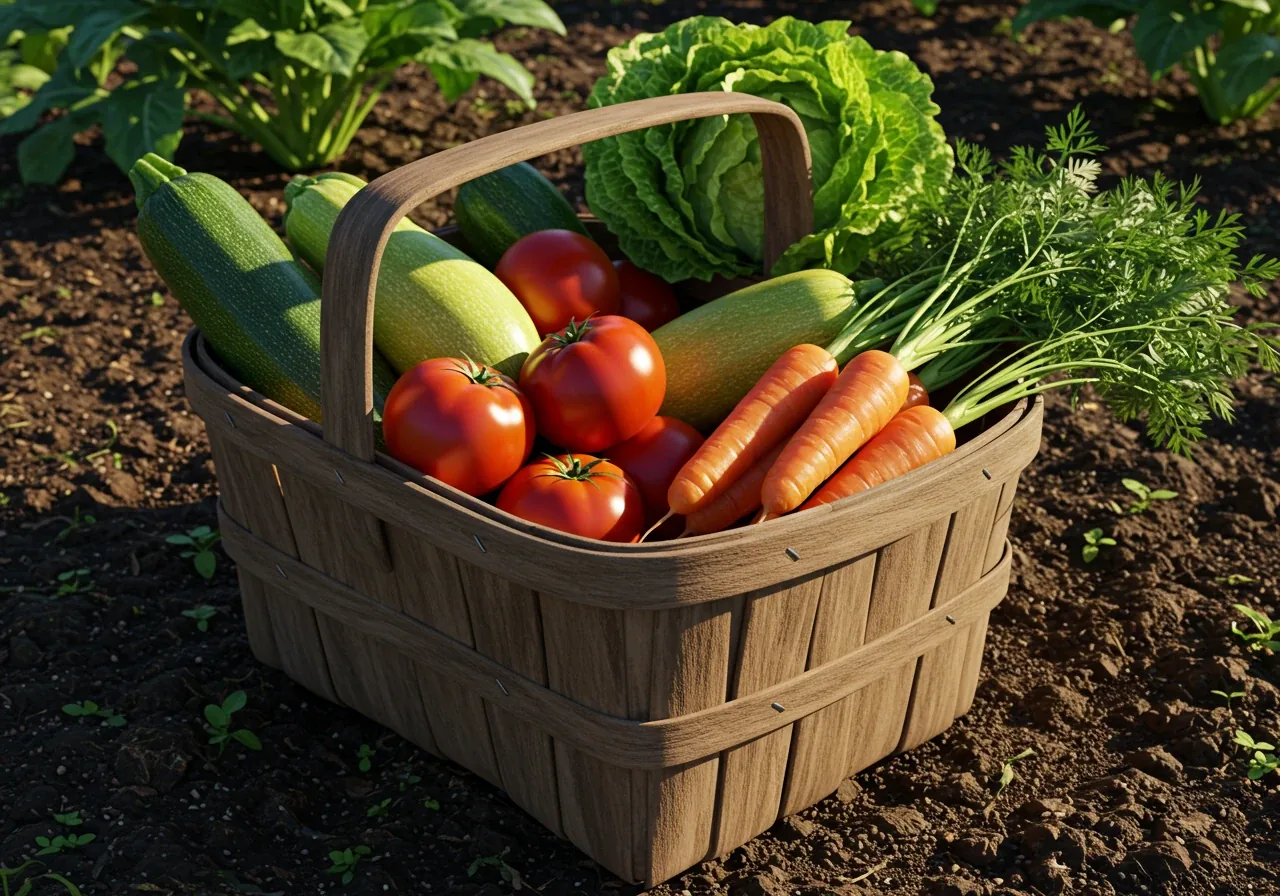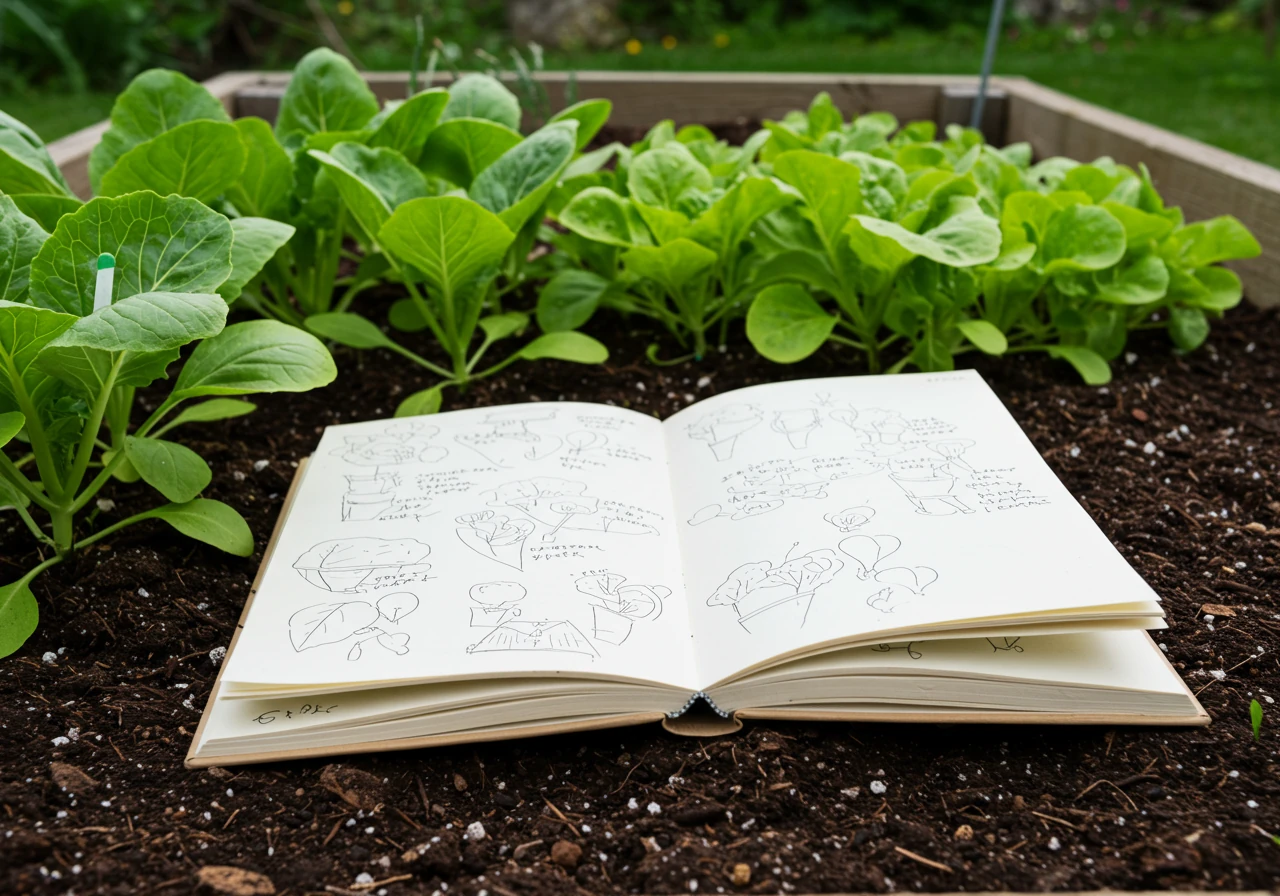Track Kars Plant Success: Garden Records Boost Results
Ready to transform your garden? Get a personalized quote today!
Request Your Free QuoteQuick Takeaways:
- Keeping garden records helps repeat successes and avoid past mistakes.
- Track plant varieties, planting dates, location, care (watering/fertilizing), weather, pests, and harvest yields.
- Use simple tools like notebooks or spreadsheets/apps – consistency is key.
- Review notes seasonally to identify patterns and make action plans.
- Records aid in smarter watering, soil health, pest management, and seasonal planning.
Introduction: Unearthing Garden Gold in Kars – Why Records Matter
Hey Kars gardeners! Ever feel like your green thumb operates on a bit of a delay, especially after our classic Ottawa weather rollercoaster? You *know* you planted something amazing last spring near that shrub, but was it the prize-winning zucchini or the one the squirrels declared war on? And did that gorgeous perennial you bought survive the winter chill, or did it wave a tiny white flag somewhere between here and Manotick? Don't worry, you're not alone!
Keeping garden records isn't about tedious homework; it’s about unearthing *your* garden gold! Think of it as your personal gardening cheat sheet, your secret weapon against forgetfulness and our sometimes-finicky Kars soil. Simply noting down things like:
- Planting dates and varieties (Was it 'Beefsteak' or 'Early Girl'?)
- Which fertilizers seemed to work magic (or fizzle out)
- Sneaky pest appearances and how you tackled them
- Your actual harvest yields ( bragging rights included!)
This simple habit transforms guesswork into garden wisdom. It makes future landscaping choices easier, helps you repeat successes (and avoid disasters!), and ultimately saves you time and money. Ready to stop scratching your head and start celebrating consistent success in your Kars patch? Let's dig into why these notes are pure gardening gold!
Why Bother? The Perks of Playing Plant Detective in Your Ottawa Garden
Okay, let's be honest. The idea of keeping garden notes might sound about as exciting as watching paint dry, right? Especially after a long day battling weeds or wrestling with the hose. You’re out there to enjoy your Ottawa garden, maybe in lovely Barrhaven or Greely, not do homework! But stick with us here. Becoming a bit of a plant detective in your own backyard has some *seriously* awesome perks that make it totally worth the tiny bit of effort.

Think of it this way:
- Solve the Mystery of the Missing Plant: Remember that gorgeous perennial you planted last spring? Did it survive our enthusiastic Ottawa winter, or did it ghost you? Notes help you track what thrives and what throws in the trowel in *your* specific patch. You'll know which plants are tough enough for our climate and which ones need extra babying or are better left at the nursery.
- Become a Pest & Disease Super-Sleuth: Noticed those weird spots on your tomato leaves *again*? Or are aphids throwing a party on your roses? Keeping track lets you spot patterns. Maybe powdery mildew only shows up after a week of humid weather, or cutworms favour a certain corner of the veggie patch. Knowing *when* and *where* problems pop up makes treating them way easier. For more on this, check out these handy tips for Osgoode Garden Logs: Pest & Disease Tracking for Summer Success.
- Crack the Code for Maximum Awesome: Why did your peppers go gangbusters last year but sulk this year? Was it the new compost? The extra watering? Your notes hold the clues! You can figure out exactly what makes *your* specific soil sing and which plants truly love the spot you gave them. This knowledge lets you repeat your wins. Dive deeper into how Kars Garden Records Help You Track Success and Save Time and discover more Winchester Garden Records: Tracking Success Tips.
- Stop Re-Doing and Re-Buying: Ever bought the same plant two years in a row, only to remember (too late!) that it totally flopped the first time? Or forgotten a crucial step, like protecting sensitive shrubs from road salt spray before winter hits? Your notes act as your garden brain, preventing costly mistakes and reminding you of essential seasonal tasks. Speaking of winter, don't forget about Nepean Fall Prep: Protecting Your Garden from Road Salt Damage.
- Smarter Future Planning: Armed with your detective notes, planning next year's garden or even bigger landscaping projects becomes a breeze. You'll know what works, what doesn't, and where you might want to invest your time and money for the best results. And if you decide on a major overhaul or need a hand with maintenance, knowing your garden's history helps professionals understand your needs better too. You can always explore professional Landscaping and Gardening Services when you're ready for bigger changes or need expert help. Check out our Google My Business page for reviews and updates!
So, grab a notebook or fire up an app. Playing plant detective isn't about adding chores; it's about gardening smarter, saving money, and creating an even more beautiful and productive Ottawa oasis you can be proud of!
Your Garden Journal Hit List: What Exactly Should You Track?
Okay, so you're ready to turn that blank notebook (or fancy app) into your gardening superpower command center. But what *exactly* should you be jotting down? Don't worry, you don't need to write a novel about every earthworm sighting. Think of it as your garden's highlight reel and occasional blooper log. Here’s a hit list of what’s worth tracking:

1. The Who's Who (Plant Edition):
- What to track: Plant name (common *and* botanical if you're feeling fancy!), specific variety (e.g., 'Big Boy' tomato vs. just 'tomato'), where you bought it, and the date you planted it. Need help with garden installs? We can assist!
- Why it matters: Prevents the classic "What *was* that amazing purple flower?" mystery next spring. Knowing the variety helps you repurchase winners or avoid duds. Plus, if something fails quickly, knowing the source might be useful (though garden center warranties can be tricky!).
- Example: May 15: Planted 6 'Celebrity' tomato seedlings (from Green Thumb Nursery) in Bed #3.
2. Location, Location, Location:
- What to track: A simple map of your garden beds or containers. Note where each specific plant lives. Also, jot down observations about the area – sun exposure (full sun, part shade?), soil type (is it heavy clay like some parts of Nepean, or sandy?), and drainage.
- Why it matters: Helps you rotate crops (important for veggies!), remember where dormant perennials *should* be, and troubleshoot problems. Maybe those sad-looking beans are in a spot that gets less sun than you thought? A map solves the puzzle. If you're overhauling an area, knowing the soil challenges is key before calling a professional landscaping and garden services team.
3. TLC Notes (Tender Loving Care):
- What to track: Watering frequency (especially during dry spells), what fertilizer or compost you used and when, dates you pruned, deadheaded, or divided plants. Consider tracking mulching and edging efforts too.
- Why it matters: Helps you understand what works! Did that fish emulsion really make the roses pop? Did watering deeply twice a week work better than a daily sprinkle? It also prevents over-fertilizing (a common mistake!). Keeping things tidy with regular pruning is part of good plant health, but if it gets overwhelming, remember there's always help available through an ongoing garden maintenance service.
4. The Ottawa Weather Report (Your Micro-Climate):
- What to track: Our infamous first and last frost dates! Major weather events like hail, wicked heat waves, or surprise June snow (hey, it's Ottawa!). Maybe note weekly rainfall if you have a rain gauge. Need help preparing for winter? Check out our city property cleanup service.
- Why it matters: Frost dates dictate your planting and harvesting schedule for tender annuals. Knowing how extreme weather affected certain plants helps you plan protection for next time. Understanding rainfall helps gauge your watering needs. For hyper-local weather, check out Environment Canada Ottawa.
5. Pests & Problems Patrol:
- What to track: What critters or diseases showed up (aphids, powdery mildew, Japanese beetles, those pesky squirrels?), when and where you saw them, what you did about it, and if it worked.
- Why it matters: Early detection is key! Noticing patterns (e.g., mildew after humid days) helps you prevent future outbreaks. Knowing what *didn't* work saves you from trying ineffective treatments again. Keeping beds clear of debris can also help deter pests; consider a seasonal property cleanup service for your city lot to minimize hiding spots. If you're in Greely and dealing with a major infestation aftermath, a dedicated Greely property cleanup service can help reset the space. Need help in Marionville? Check our Marionville property cleanup service or Marionville garden clean up service. For Metcalfe, see our Metcalfe property cleanup service and Metcalfe garden clean up service options.
6. The Payoff! (Harvest & Blooms):
- What to track: For veggies and fruit: harvest dates and yield (approximate quantity or weight). For flowers: first bloom date, peak bloom period, and when they finished. Add notes on flavour or flower quality!
- Why it matters: Helps you plan how *much* to plant next year (did six zucchini plants *really* seem like a good idea?). It’s also super satisfying to see your success written down – instant mood booster and proof your hard work paid off!
Don't feel pressured to track *everything* right away. Pick what seems most helpful for *you* and your garden goals. Even a few notes are better than none! To make it even easier, you could create your own simple log sheet or look for a downloadable template. (Psst... perhaps a handy garden journal checklist template might magically appear if you look around!) Happy tracking!
Gearing Up: Tools & Tech for Top-Notch Tracking (Low-Stress Options!)
Okay, let's talk tools! You're ready to become a garden record-keeping rockstar, but what gear do you actually need? Relax, you don't need a high-tech command center (unless you want one!). The best tool is simply the one *you'll actually use*. Think of it like choosing between a trusty shovel and a fancy tiller – both get the job done, just differently! Let's look at some low-stress options:

The Tried-and-True Classics (Low-Tech)
- The Humble Notebook: Grab a sturdy notebook (maybe one that can handle a bit of dirt!).
- Pros: Super simple, cheap, feels satisfyingly old-school. No batteries required! Great for quick notes and sketches right there in the garden.
- Cons: Can get messy, harder to search for specific info later, and might not survive a surprise Ottawa downpour.
- The Organized Binder: Use a binder with clear plastic sleeves.
- Pros: Keeps things neat, you can add seed packets, plant tags, photos, and printouts. Easy to rearrange pages.
- Cons: Bulkier than a notebook, not as easy to carry around the yard while weeding.
Low-tech works brilliantly! You can easily jot down notes about your soil preparation methods or track which mulch worked best, helping with future material selection.
The Digital Garden Helpers (Higher-Tech)
- Spreadsheets (Excel, Google Sheets): For the data fans out there!
- Pros: Excellent for sorting and searching data (find all your tomato notes instantly!), calculating totals (like harvest yields), accessible on multiple devices.
- Cons: Needs a phone, tablet, or computer. Can have a slight learning curve if you're new to spreadsheets. Less "in the moment" feel than pen and paper.
- Gardening Apps: Lots of options designed specifically for gardeners (e.g., Gardenize, GrowIt!, Planta).
- Pros: Often have built-in reminders, photo logging, weather integration, and plant databases. Very portable on your phone.
- Cons: Some cost money, you're dependent on the app developer, might have *too many* features, and screen glare can be annoying in bright sun.
Digital tools can be great for organizing large amounts of data, especially for bigger properties needing services like our Ottawa property cleanup service or Marionville property cleanup service.
Quick Comparison Table
| Feature | Notebook/Binder | Spreadsheet/App |
|---|---|---|
| Cost | Low | Free to Moderate |
| Portability | Fair to Good | Excellent (Phone) |
| Searchability | Low | High |
| Durability | Okay (Watch out!) | Device-Dependent |
| Ease of Use | Very Easy | Easy to Moderate |
Someone with sprawling beds out in Metcalfe might love a detailed spreadsheet to manage everything, while a gardener with a few containers in central Ottawa might find a simple app or notebook perfect.
Ultimately, whether you're tracking pests to know when to call for an Ottawa property cleanup service after an infestation, noting bloom times, or reminding yourself that the back corner needs attention (maybe even from a dedicated crew like a Marionville property cleanup service if things get wild!), the goal is consistency. Keeping track helps you manage tasks better, making it easier to decide if you need help from an ongoing garden maintenance service down the road.
So, pick what feels right! Try one method, and if it doesn't stick, try another. The goal isn't perfection, it's progress. Happy tracking!
Making Sense of Your Scribbles: Turning Records into Results
Okay, Gardener! You've diligently scribbled notes, snapped photos, maybe even wrestled with a spreadsheet. High five! But now what? Those records aren't just nostalgic reading material (though remembering that bumper tomato crop *is* nice). It's time to turn those scribbles into *results*. Let's figure out how to make sense of it all without needing a degree in data analysis. Think of it as your garden whispering secrets – you just need to listen!

Your Simple Guide to Garden Record Gold-Mining:
- Pick Your Moment: Don't try to analyze everything mid-planting frenzy. Set aside a little quiet time, maybe at the end of a season, or even once a month with a cup of tea. The key is *consistent*, not constant, review. Late fall, as the garden winds down here in Ottawa, is often a perfect time.
- Play Detective - Look for Patterns: Spread out your notes (or scroll through your app). What jumps out?
- Did the same pests show up around the same time each year? (Aha! Squash bugs love early July in my Richmond garden!)
- Which plants consistently thrived, and which sulked no matter what? (Note to self: Forget planting lavender in that shady, damp corner.)
- How did your watering schedule match up with rainfall? Did things wilt during dry spells? Check local resources like the Rideau Valley Conservation Authority for watershed conditions.
- Celebrate Wins, Acknowledge Flops: Be honest! What worked *really* well? Maybe that compost tea recipe was magic, or planting marigolds actually *did* seem to deter pests from your tomatoes. Equally important: what bombed? Was it the plant choice, the location, or maybe a soil issue? For instance, if your notes consistently mention poor drainage and stunted growth in one bed, improving the soil preparation there should be a top priority next spring. Maybe even consider sod installation for lawn areas struggling nearby.
- Ask "Why?" (Gently!): Connect the dots. Why did those beans thrive? Oh, right, that was the year I added extra compost. Why did the perennials near the driveway look sickly? Ah, the notes mention road salt splash – maybe a salt-tolerant variety or better winter protection is needed. Why did that section get so overgrown with weeds? Perhaps it needs more mulch, more attention, or even a thorough property clean-up to reset the space.
- Make a Simple Action Plan: This is where the magic happens! Turn your insights into concrete steps for next time.
- Problem: Powdery mildew on Bee Balm every August. Action: Increase air circulation next year by dividing the clumps, or switch to a resistant variety. Consider a good fall cleanup via an Ottawa yard cleanup service to remove infected debris. Check options for a city yard cleanup service or specific areas like Marionville yard cleanup service or Metcalf yard cleanup service.
- Success: Carrots grew huge in Bed #2! Action: Plant carrots there again, remembering the soil amendments used.
- Challenge: Keeping up with weeding feels impossible. Action: Plan for thicker mulch application, investigate groundcover options, or budget for some help through an ongoing garden maintenance plan. Understanding the scope of work needed also helps when you request estimates and provide feedback if you decide to hire pros.
Your records are your personal roadmap to a better garden next season. By taking a little time to review them, you stop guessing and start gardening smarter, saving yourself time, money, and maybe even a few gardening headaches in Vernon or wherever your beautiful Ottawa-area garden grows!
*Illustrative data showing potential impact of record keeping on harvest success.
Seasonal Smarts & Eco-Friendly Edges Through Record Keeping
Alright, so you've got your notes! Maybe they're scribbled in a trusty notebook or neatly organized in an app. Now let's level up your gardening game by using them for some serious *seasonal smarts* and flexing those eco-friendly muscles. Keeping records isn't just about remembering if those prize tomatoes were 'Big Boy' or 'Beefmaster'; it's about getting in tune with *your* garden's unique rhythm right here in Ottawa. Knowing from your notes that your patch in, say, Greely typically thaws a week later than downtown helps you perfectly time your spring planting and avoid frost-related *oopsies*. It transforms generic advice into personalized, timely action for *your* specific corner of the world!

This is where your garden diary really helps you go green. Water conservation becomes *way* easier when your notes tell you precisely how thirsty that sunny spot near the patio gets after only two rain-free days, or remind you that last July's steady drizzle meant you barely needed the sprinkler. No more guesswork spraying everything down – just targeted watering where it counts, saving water and keeping plants happier (overwatering is a surprisingly common plant-killer!). Same goes for boosting your soil health naturally. Tracking which compost mix made your peppers sing, or remembering to rotate your veggies because your notes show diminishing returns in Bed #1, helps build richer, living soil over time. This means less reliance on chemical fertilizers and stronger, more resilient plants. Learn more about soil at the Ontario Soil and Crop Improvement Association.
Remember battling aphids last June? Or maybe those pesky red lily beetles that seem to appear overnight? Your records pinpoint the 'when' and 'where', letting you tackle pests smartly with Integrated Pest Management (IPM). Instead of reaching for a broad-spectrum spray at the first sign of trouble, your notes might prompt you to release beneficial insects *before* the problem peaks, or to simply check under specific leaves daily during 'pest season'. Dealing with a major infestation's aftermath, like masses of diseased leaves? Your notes can help you identify the scope and schedule a thorough cleanup; for residents needing assistance in specific areas, knowing a targeted Metcalf yard cleanup service is available can be helpful for removing problematic plant debris responsibly. Furthermore, tracking which native plants thrive in your conditions boosts local biodiversity, creating a welcoming habitat for our Ottawa birds and bees. Consistent fall tidying, guided by your notes on what needs cutting back or benefits from winter protection, is also key for garden health and reducing pest overwintering spots – something a professional Ottawa yard cleanup service can certainly assist with, ensuring green waste is handled according to local guidelines (check City of Ottawa Green Bin info). It's always wise to understand how service providers operate; reviewing their Terms and Conditions often clarifies their practices regarding waste disposal and other important details.
You can even turn these insights into a personalized seasonal calendar! Imagine a little snippet for your garden: *"Early May (notes show): Harden off tomato seedlings. Watch for lilac leaf miner activity. Last frost typically around May 15th here."* It’s your custom garden guide, built from your own experience! This proactive, informed approach, fueled by your own data, leads to a more beautiful, productive, and sustainable garden that truly thrives in our unique Ottawa climate. And hey, if you ever share detailed garden notes or photos with a service provider, perhaps the crew handling a Marionville garden clean up service to get things back in shape, it’s smart to be aware of how your information is managed – a quick look at their Privacy Policy can offer peace of mind. Ultimately, your records empower you to garden smarter, greener, and with way more confidence!
Record Keeping Workflow Example
Step 1: Plant & Note
When planting (e.g., spring annuals), immediately note the date, variety, source, and location on your map or list.
Step 2: Observe & Record
Weekly (or bi-weekly), walk the garden. Note watering needs, first blooms, pest sightings (snap a photo!), or signs of stress.
Step 3: Track Treatments/Care
Record when you fertilize, prune, apply pest control (what kind? did it work?), or add compost/mulch.
Step 4: Log Harvests
Jot down harvest dates and rough quantities (e.g., "5 lbs tomatoes", "First zucchini harvest"). Note flavour or issues.
Step 5: Seasonal Review
In late fall/winter, review all notes. Identify patterns, successes, failures, and make an action list for next year.
Quick Start Guide to Garden Records
Feeling overwhelmed by the idea of garden journaling? Don't be! Getting started is easier than wrestling a hose on a hot day. Here’s your super-simple, no-stress cheat sheet:
- Start Simple, Seriously! Grab any old notebook or even just the notes app on your phone. Forget fancy formats for now. Just jot down *something* – plant names, planting dates, maybe a quick doodle of your garden layout. Aim for progress, not perfection!
- Focus on the Headlines: What did you plant, where did you put it, and when? Note the absolute smash hits (those amazing peppers!) or the slightly tragic flops (R.I.P. mystery seedling). Also, make a quick note of major pest invasions or significant Ottawa weather events (like that unexpected late frost!).
- Get Snappy: Your phone's camera is your best friend! Take quick photos of plant tags, flowers in bloom, weird bugs, or areas you want to improve. Visual notes are super helpful later. Looking for inspiration on what well-planned gardens can become? Check out some amazing local garden makeovers and transformations to see the potential!
- Note Your Inputs & Helpers: Did you use a specific fertilizer that worked wonders? Add amazing local compost? Remember to jot it down. If you hired help for a task, like a spring spruce-up from a local crew such as a Metcalf garden clean up service, note that too. Knowing what you did, or who helped you achieve great results, is golden info for the future. Curious about professional teams? You can learn more about who we are and our philosophy on our site.
- Glance Back Occasionally: Before you start planning next season or buying seeds, take 10 minutes to flip through your notes or photos. What thrived? What sulked? This quick review turns past experiences into future successes. Still have questions or need specific advice for your space? Don't hesitate to get in touch with our team. We're happy to help, and rest assured, we take your privacy seriously – you can view our data handling privacy policy online anytime. For expert local advice, consider resources like the Master Gardeners of Ottawa-Carleton.
That’s it! Just start small, be consistent (even if it’s just weekly notes), and watch your garden knowledge grow. Happy gardening!
Ottawa Garden Record FAQs: Your Questions Answered
Got questions about keeping garden records here in the Ottawa area? You're not alone! It might seem like extra work, but trust us, a little note-taking goes a long way. Here are answers to some common head-scratchers:
Great question! With clay soil, definitely track your soil amendments – what compost or sand you added, when, and how much. Note drainage patterns (puddles after rain?). Record which plants truly thrive versus ones that sulk in the heavy stuff. Careful notes on watering frequency are also key, as clay holds moisture longer. This data helps plan future plantings or even inspiring garden transformations suited to your specific conditions.
Don't aim for constant analysis! The most crucial times are a quick review before spring planting (what worked/failed last year?) and a more thorough look in late fall. That fall review, perhaps after a big tidy-up with an Ottawa garden clean-up service, helps you plan for next season based on the whole year’s performance. Quick monthly peeks during summer can catch emerging issues too.
Absolutely! Your lawn is a big part of your yard's ecosystem. Jot down fertilizing dates and types, when you overseeded, any grub sightings or weed battles, and your watering habits. Knowing this helps you troubleshoot bare patches or colour issues and build a healthier lawn over time. Consistent notes make managing regular expert lawn care much simpler if you decide to get help.
Nope, not at all! The best time to start was last year, but the second-best time is right now. Begin tracking *this* season. Note what you plant, where you put it in your Nepean or Greely garden, how it performs, any pest visitors, and major weather points. Any information you gather this year is valuable intel for making smarter gardening decisions next year!
Yes, maybe even more so! In tight spaces, every square inch counts. Records help you maximize yield and beauty by tracking precise sun exposure in different spots, container watering needs (they dry out fast!), and what works well vertically. It prevents costly mistakes and helps you plan efficiently, even identifying when a targeted professional city garden clean-up service might be useful for seasonal chores in confined areas.
Conclusion: Cultivate Success in Kars – Start Tracking Today!
So there you have it, folks! Keeping garden records in Kars really isn't about adding chores; it’s your secret weapon for gardening success. Think of it as your personalized guide to navigating everything from our tricky Ottawa climate to the specific quirks of your own backyard soil, whether you're in Kars, Greely, or closer to the city core. We’ve covered how these notes – simple scribbles or detailed entries – help you:
- Remember which plants were winners (and which were duds).
- Become a pro at spotting pest patterns early.
- Repeat your biggest gardening triumphs year after year.
- Make smarter landscaping decisions and save precious time and money.
Ultimately, tracking helps you understand *your* garden's unique story. It transforms guesswork into wisdom, letting you cultivate the beautiful, productive space you envision.
Why wait for next season’s mysteries? Grab a notebook, fire up an app, whatever feels easiest for you – the important thing is to *start tracking today*! Even noting down just your planting dates and maybe snapping a few photos is a fantastic beginning. And remember, if your records highlight tasks that feel a bit overwhelming, or inspire bigger landscaping dreams, having that detailed history makes collaborating with professionals for things like seasonal cleanups (e.g., Ottawa Yard Cleanup) or ongoing garden maintenance even more effective.
Ready to apply these insights or need expert help making your garden thrive?
Contact Clean Yards Today!Now we're curious: What's the most surprising thing you've ever learned about your garden from keeping notes (or wish you had noted down)? Share your thoughts below!
(Note: Comment section functionality not included in this standalone HTML example.)

